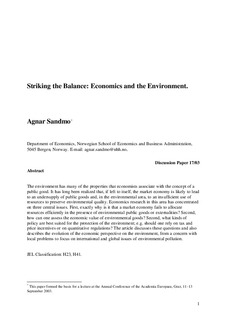| dc.description.abstract | The environment has many of the properties that economists associate with the concept of a
public good. It has long been realized that, if left to itself, the market economy is likely to lead
to an undersupply of public goods and, in the environmental area, to an insufficient use of
resources to preserve environmental quality. Economics research in this area has concentrated
on three central issues. First, exactly why is it that a market economy fails to allocate
resources efficiently in the presence of environmental public goods or externalities? Second,
how can one assess the economic value of environmental goods? Second, what kinds of
policy are best suited for the protection of the environment; e.g. should one rely on tax and
price incentives or on quantitative regulations? The article discusses these questions and also
describes the evolution of the economic perspective on the environment, from a concern with
local problems to focus on international and global issues of environmental pollution. | en |
